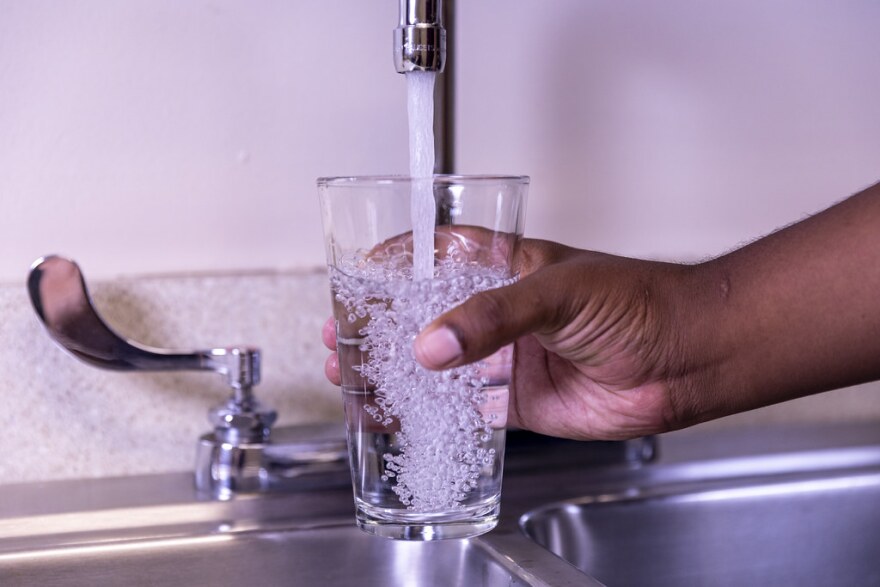Most of Kentucky’s water utilities are currently statutorily required to add fluoride to their drinking water supplies, but a bill making its way through the state legislature could change that.
Kentucky law requires water systems serving 3,000 or more customers to fluoridate their supplies “to protect the dental health of the people served by the supply.” Data from the Centers for Disease Control and Prevention indicates that over 99% of Kentuckians last year were served by companies that provide fluoridated water.
An optional water fluoridation measure also advanced out of a House committee last year, but never got a full chamber vote.
Over 30 Republican lawmakers have signed on to co-sponsor this year’s legislation, which passed out of a state House committee Thursday. Lead co-sponsor Rep. David Hale, of Wellington, said the measure is not an “anti-fluoridation bill.” Instead, the Republican argued it would simply give local governing bodies – like city councils or local water district boards – a say in whether they want fluoride in their water.
“This does not mandate removal. It just brings it back to a local body of control,” Hale said. “All this bill does is gives them the option, if they so choose, if they want to discontinue placing fluoride in their drinking water systems, then they have that choice.”
Rep. Mark Hart has introduced a version of an optional water fluoridation bill in nearly every session since 2018. Hale said Hart was out sick on Thursday and was unable to testify on the bill in committee.
This year’s bill comes amid comments from some high-ranking U.S. officials suggesting that fluoride is linked to numerous health problems. Among the critics is Secretary of Health and Human Services Robert F. Kennedy Jr., who claimed following President Donald Trump’s 2024 election victory that fluoride is an “industrial waste.” At the time, Trump said he had not spoken with Kennedy about removing fluoride from water supplies, but said “it sounds OK to me.”
Several health organizations, including the American Dental Association, the American Academy of Pediatrics and the CDC, recommend communities add low levels of fluoride to their water supplies to help prevent tooth decay. The practice first began in parts of the United States 80 years ago, and the CDC has called it one of the 10 great public health achievements of the 20th century.
Dr. Steve Robertson is a dentist and the executive director of the Kentucky Dental Association. He said, while he recognizes the bill is not necessarily an anti-fluoride bill, he is concerned about who exactly would get to make the call about something that could impact the public health of a community if it passes.
“What we are concerned about is if we give the ability for that decision to be made locally, who is actually going to be making that decision?” Robertson told lawmakers ahead of the bill’s committee passage Thursday. “Will they be elected and truly representing the local population or not? Will it be an appointed board that may not necessarily represent the bulk of the people in the community?”
Dr. Brittany Camenisch – a professor at the University of Kentucky College of Dentistry who also owns a dental practice specializing in periodontics, a field which focuses on treating gum disease – also addressed lawmakers Thursday. She said water fluoridation is the “most effective and socially equitable means” of preventing caries, or tooth decay, and said she is concerned that allowing local municipalities to stop adding fluoride to their water could impact dental health for people with limited access to dental health professionals.
“Removing the free and publicly accessible caries prevention measure that is water fluoridation removes a crucial social safety net and will lead to an increase in cavities, pain and missed school for the most vulnerable in our community,” Camenisch said.
According to fiscal notes from Governor Andy Beshear’s office, House Bill 16 could cost Kentuckians between $19.7 million and $59.1 million in added dental healthcare costs if utility providers choose to stop adding fluoride to their water supplies. The estimates include an increase of between $3.94 million and $11.8 million in state funds to treat increases in cavities and other dental health issues. Those numbers are based on an assumption of between 10 and 30% of Kentuckians not receiving fluoridated water if the bill passes.
The bill now moves to the full House for approval.





